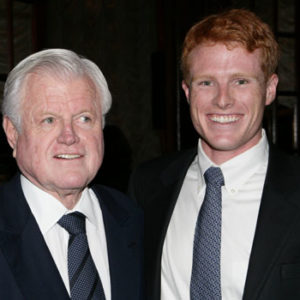In the upcoming U.S. Senate primary between Democrats Sen. Ed Markey and Rep. Joe Kennedy, the headlines tell the story.
For the political savvy readers of Politico, it’s “Kennedy To Challenge Markey for Massachusetts Senate Seat.” But at People Magazine, which spends more time covering Prince Harry than it does politics, the headline is: “RFK’s Grandson to Run for U.S. Senate.”
And across the pond, where they know a thing or two about covering royalty, the London Telegraph writes “Joe Kennedy, Scion of America’s Most Famous Political Family, to Run for US Senate.”
Senator Markey may be the incumbent, but for fans of the Kennedy family, he’s merely an inconvenience.
On Saturday, Joe Kennedy, 38, announced his long-rumored challenge of the incumbent. “Big news: This isn’t a time for waiting, for sitting on the sidelines, or for playing by rules that don’t work anymore. This is the fight of our lives, the fight of my generation — and I’m all in,” Kennedy said in a tweet.
The key phrase in that message is “fight for my generation.” When Markey, 73, was first elected to Congress in 1976, JK3 (as the congressman is known on Twitter) was still four years away from being born. Many political pros believe that fact, along with the Kennedy name, is probably enough to make JK3 the third “Senator Kennedy” from Massachusetts.
“This is Congressman Kennedy’s race to lose,” Emerson College’s Director of Polling Spencer Kimball tells InsideSources. “With polls showing Kennedy ahead 10-15 points a year out from the primary, Senator Markey as in the rare position of also being an underdog.”
Massachusetts Democratic strategist Mary Ann Marsh told a Boston TV station last month: “If Joe Kennedy gets into this race against Ed Markey, Joe Kennedy is not only the front-runner, he wins that race.”
Veteran Bay State GOP campaign strategist Patrick Griffin is even more blunt:
“They’re both far-left Massachusetts liberals who, if they served together in the Senate, would likely have identical voting records,” he told InsideSources. “The only difference is that one is young and has the most popular last name in American politics; while the other has been in politics since the Nixon administration, but if you paged him at Logan [Airport], most people wouldn’t recognize the name.”
Early polls show Kennedy already has a lead over Markey, but the Senator’s allies insist the race is far from over.
Sources close to the campaign point to the 120 Bay State legislators who have already endorsed his re-election and the enthusiastic reception he received at the recent Democratic state convention as proof that Markey has the support he needs to win — even against a Kennedy. They also note his high-profile supporters like fellow Massachusetts Sen. Elizabeth Warren and Green New Deal legislative partner Rep. Alexandria Ocasio-Cortez (D-N.Y.).
However, Ocasio-Cortez inadvertently revealed the challenge Markey’s campaign faces when she tried to push back against the same “generational change” argument that swept her and allies like Rep. Ayanna Pressley (D-Mass.) into office over Democratic incumbents. On Thursday she told reporters, “Sen. Markey is the generational change we’ve been waiting for,” because generational change “isn’t just about voting for who’s younger.”
An interesting argument, to say the least.
And then there’s the passion problem. After more than 45 years in elected office, a June 2019 Suffolk poll found a third of Massachusetts voters had never heard of Markey or didn’t know enough to have an opinion. Sen. Warren’s first political campaign wasn’t until 2012, and what was her number? One percent.
Markey’s name ID has since risen, according to a new Suffolk poll released earlier this month, thanks to the publicity surrounding a possible Kennedy candidacy. But even that poll gives Kennedy a 42-28 percent lead over Markey.
Markey’s case is a reminder that “activists” and “voters” aren’t necessarily the same people. Activists know that Markey is the second-most far-Left member of the US Senate (trailing only Warren, according to Progressive Punch) and that he’s been an aggressive advocate of the Green New Deal, government control of the internet and other progressive causes. But most voters either don’t know who he is, or they don’t like the little they’ve heard about him. Markey’s approval in the latest Suffolk poll is below 40 percent, in one of the most Democratic states in the country.
It should be noted that Markey faced progressive challengers like Boston attorney and activist Shannon Liss-Riordan even before Kennedy started hinting about a run. Businessman Steve Pemberton and “Fair Tax” candidate Allen Waters are also running in the primary. But even with those names thrown in the mix, a new poll published by Commonwealth Magazine gives Kennedy a 31-19 percent lead.
Markey’s problem is that most Massachusetts Democrats don’t actually care which of the two liberals represents their state. Warren, for example, has endorsed her Senate colleague, but she’s also gone out of her way not to criticize Kennedy. “I have nothing but the highest respect for him and I have no criticism [of his decision to run],” she said.

